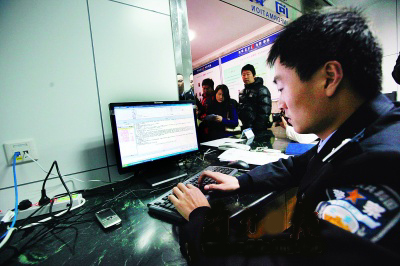Severe penalties for hacker crimes
 0 Comment(s)
0 Comment(s) Print
Print E-mail
China.org.cn, August 30, 2011
E-mail
China.org.cn, August 30, 2011
China's Supreme People's Court (SPC) and Supreme People's Procuratorate (SPP) on Monday jointly issued a legal interpretation that aims to fight hacking and other Internet crimes more aggressively, Xinhua reported.
|
|
|
The Supreme People's Court and Supreme People's Procuratorate on August 29, 2011 jointly issued a legal interpretation that aims to fight hacking and other Internet crimes more aggressively. In the file photo the Shenzhen Futian Police set up the country's first network police station in early 2011 to combat?Internet crimes. |
The legal interpretation will come into effect on September 1.
People who hack from 20 to 100 computers, or steal from 10 to 50 user names and passwords for online-payment or stock accounts, will get at least three years in prison. And those who hack even more computers or steal more passwords will face jail terms of up to seven years.
A?crime endangering information network security poses a threat not only to network security but also to national security and public interests.
The legal interpretation on handling cases involving activities that endanger information network security is aimed at cracking down on such crimes with greater force, according to the statement.
The interpretation has defined relevant terms, and clarified criteria for imposing penalties in cases regarding illegally obtaining computer network data or providing hacking tools or programs, among others.
China is one of the countries most affected by hacking and cyber crimes, according to the statement.
More than 1 million IP addresses in China were controlled from overseas in 2009, 42,000 websites were distorted by hackers, and 18 million Chinese computers have been infected by the Conficker virus every month, or about 30 percent of computers infected globally, the statement says, citing previous research.
Statistics from the Ministry of Public Security show that the number of viruses circulating on the internet has surged 80 percent year-on-year in the past five years. The ministry also estimates that eight out of ten internet-connected computers are controlled by hackers.
The interpretation will be an effective way to prevent people from hacking computers, Tang Hongxin, a Beijing-based lawyer specializing in criminal regulations at Yingke Law Firm said.
Other experts think differently. Liu Qing, an official who deals with network security for a Shanghai-based information technology company, did not think the interpretation will do much to impede hackers.
"I have helped companies, especially middle-sized and small ones, maintain their websites' security. But we couldn't stop the hackers," he said.
"There are huge business interests behind those computer invasions, which is also the reason why the hackers can survive these crackdowns," he added.
(China Daily contributed to this story)






